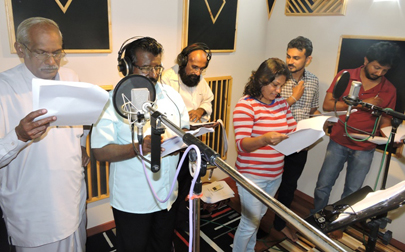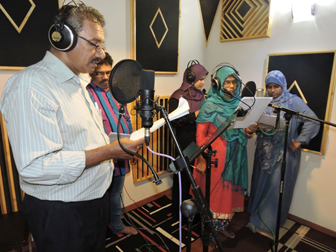Radio drama strengthens religious diversity and pluralism
'Radio drama has been evolving as an art with enormous scientific
elements, and has proved its potential to strengthening religious
diversity and pluralism in Sri Lanka,' said Prof. W A D P Wanigasundera,
Chairperson of the Sri Lanka Development Journalist Forum (SDJF),
sharing his view about a Radio drama initiative implemented by SDJF,
promoting freedom of religion and pluralism.
 |
|
A radio drama in progress |
"Positive social change is a very dynamic process and might take a
gradual phase towards behavioural change. It is one of the arts, that
has immense power and potential that helps not only the listeners, but
also everyone who is involved in writing, editing and production, to
internalise the value it intends to cater.
What is interesting about the Radio drama initiative is that that it
features civil society participation in writing and nurturing the
scripts," he said.
The Sri Lanka Development Journalist Forum engaged 24 young radio
drama writers, who are fluent in Sinhala and Tamil. As an end result,
after the story-hunting and training with eight days of residential
workshop, the youth concluded writing 12 radio drama scripts.
Scripts
After voicing the dramas from the scripts created by the youth,
veteran radio drama artists such as K. Chandrasekeran, Ulepane
Gunasekara, Senani Wikramasinghe, Ashroff Sihabdeen enthusiastically
commented on the scripts. They indicated that the dramas were written
with critical sense, a balanced approach, and in a manner that appealed
attention towards freedom of religion and pluralism.
Before the dramas were written, the young writers were divided into
mixed groups and sent to a story-hunting visit. The purpose of the visit
was to encourage the young writers to stay three to four days in a
targeted community and bring a real world essence to their scripts. It
also aimed to bring the civil society inputs to the scripts from the
very beginning of the process.
During the story-hunting visit, young writers were exposed to
different religious lives, connected practices, issues and perceptions
while hunting for their unique characters, plots, story lines and case
studies for the drama scripts.
Opportunities
Young writers met civil society leaders, government servants, the
public, youth, women and children to gain more perspectives on deeply
rooted issues in the community that were connected to the theme.
Participants had opportunities to interact with women groups as to
understand a gender perspective on the issue. Some Tamil and Muslim
youth writers did voluntary activities in Buddhists temples in their
visits, while Sinhalese writers had similar experiences in Muslim
Mosques.
Ninety percent of the writers agreed that the story hunting visits
positively influenced the content in their drama.
 After the story-hunting visit, 24 writers attended a professional
training on modern radio drama in promoting freedom of religion and
pluralism. The first phase of the training focused on mobilising the
knowledge gained through the story hunting visits for the radio drama,
while the second phase of the training concentrated on providing skills
and knowledge on creating radio drama scripts under developing
characters, concentrating them with freedom of religion and religious
pluralism, developing story lines, scenes and script editing etc. After the story-hunting visit, 24 writers attended a professional
training on modern radio drama in promoting freedom of religion and
pluralism. The first phase of the training focused on mobilising the
knowledge gained through the story hunting visits for the radio drama,
while the second phase of the training concentrated on providing skills
and knowledge on creating radio drama scripts under developing
characters, concentrating them with freedom of religion and religious
pluralism, developing story lines, scenes and script editing etc.
During the process of writing the scripts, activities were carried
out to ensure that the young writers had internalised and reflected on
connected values such tolerance, respecting diversity, dialogues,
non-violence, equality, justice, and human rights towards freedom of
religion and religious pluralism.
The last stage of the training involved tasks such as group reading,
discussion and debate about the substance and structural aspects of the
dramas to ensure that they would potentially meet the needs of the
target community.
Workshop
All the participants said the training workshop was highly useful
with regards to their personal life. Ninety-three percent said that
workshop had made them activists in promoting religious pluralism. Every
participant believes that their perception on the freedom of religion
has changed positively. More than 90% believe that they can use radio
drama in the future in different forms through the media, such as
community radio in schools and in village level societies.
What is more vital in this initiative was that SDJF formed three
storyboards that comprised 15 civil society members each and the scripts
were sent back to them for the inclusion of civil perspectives in the
content and civil participation in writing the scripts. Civil society
members contributed notable amounts of changes on some of the scripts.
Tharindu Wickremasinghe, one of the participants, said, "I didn't
think that there was anybody as racist as I was. I was 100% a racist. I
believe that we all should get together and work as one unit."
M.F.M. Firnas, a participant from Batticaloa said, "During the
process of writing my drama, the ideas of tolerance, understanding and
respecting diversity have dominated my thoughts. Now I realise my role
in promoting religious pluralism and I recognise myself as an activist".
The dramas that were produced in this process are to be aired through
community radio stations and then would be part of a large number of
community dialogues across the country.
Eventually, the dramas will be uploaded in social media platforms to
reach out to yet a wider community for cyber dialogue. This program was
funded by the Canadian Fund for Local Initiatives. For more information
write to [email protected]. |

